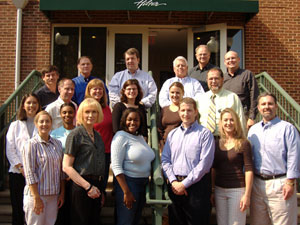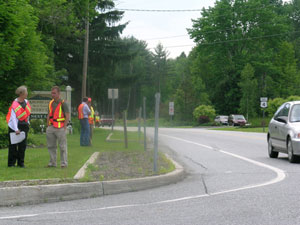U.S. Department of Transportation
Federal Highway Administration
1200 New Jersey Avenue, SE
Washington, DC 20590
202-366-4000
Focus
| Accelerating Infrastructure Innovations |
Publication Number: FHWA-HRT-07-008
Date: November 2006
Take the proactive, cost-saving approach to improving roadway safety by implementing road safety audits (RSA). An RSA is the formal safety performance examination of an existing or future road or intersection by an independent multidisciplinary team. RSAs can be used in any phase of project development, from planning to construction, and on initiatives ranging from minor maintenance activities to mega projects. The Federal Highway Administration (FHWA) recently launched a new RSA Implementation Team that will be working with State and local transportation departments, tribal governments, and Federal land management agencies to provide guidance and assistance in implementing RSAs.
Under the 2005 Safe, Accountable, Flexible, Efficient Transportation Equity Act: A Legacy for Users (SAFETEA-LU), States are required to report at least 5 percent of the locations on their public roads that are exhibiting the most severe safety needs. This report must also include remedies, costs, and impediments to implementing improvements at each of these locations. "This requirement provides an excellent opportunity to incorporate RSAs into the process of identifying improvements," says Louisa Ward, FHWA's RSA Program Manager. "RSAs can identify comprehensive solutions to these severe safety problems beyond the traditional design approach."
The RSA Implementation Team is a joint effort of FHWA's Office of Safety, Division offices, Resource Center, Federal Lands Highway Division, and Highways for LIFE program. "This is a process and program that can and will make a difference," said Beth Alicandri, Director of FHWA's Office of Safety Programs, at the implementation team kick-off meeting on September 27, 2006, in Alexandria, Virginia.
 |
| Members of FHWA's new Road Safety Audit Implementation Team. |
Several States have already started RSA programs. As part of a process to identify safety issues and countermeasures on roads in the State, the Tennessee Department of Transportation now conducts one RSA every 2 weeks. The Arizona Department of Transportation, meanwhile, has incorporated RSAs into its new Strategic Highway Safety Plan and now has an RSA Manager on staff. And the New York State Department of Transportation is integrating RSAs within its pavement overlay program, while the Vermont Agency of Transportation is working with local planning organizations to conduct RSAs.
| "RSAs can identify comprehensive solutions to severe safety problems beyond the traditional design approach." |
RSAs differ from traditional road safety review processes in that the audit typically is conducted by a larger multidisciplinary team that is independent of the project. The team may represent such disciplines as highway safety, traffic engineering, planning, design, construction, maintenance, human factors, and law enforcement. RSAs are also more comprehensive, considering all factors that may contribute to a crash, including driver error and visibility issues, as well as the needs of pedestrians and cyclists. Most importantly, safety audits are proactive, looking at locations before the development of crash patterns to correct safety issues before accidents happen.
Typical improvements suggested during an RSA include:
These improvements can help produce roadway designs that reduce the number and severity of crashes. In New York State, for example, crash reductions have ranged from 20 to 40 percent depending on the type of RSA improvement implemented. An RSA can also reduce costs by identifying safety issues and correcting them before projects are built.
The RSA Implementation Team will be introducing tools to assist States in implementing RSAs, including a new software program. The program makes it easy for audit teams to record detailed information on site, as well as to quickly produce RSA reports. The software features comprehensive prompt lists that help users identify issues that may be overlooked in the RSA process. Users can link identified issues to user-defined locations in the study area and enter accompanying comments for each issue. The software also allows users to record suggestions for improvements that may be identified. The software groups the audit findings by issue and exports the results to a Microsoft Word® compatible file that allows for quick completion of a formal RSA report. To obtain a copy of the free software, contact Eloisa Raynault at 202-366-3499 (email: eloisa.raynault@dot.gov).
FHWA also offers a new Road Safety Audit Peer-to-Peer (RSA P2P) Program. The P2P program puts agencies in touch with transportation professionals across the country who can address questions that might arise when an agency is considering performing an RSA or is conducting an RSA for the first time. "The RSA P2P program offers State and local governments the opportunity to receive firsthand information and lessons learned from their peers who are successfully performing RSAs,"says Ward. Assistance can also include a site visit as needed. The P2P program is provided at no cost to State, local, and tribal transportation agencies. For assistance, call 866-P2P-FHWA (866-727-3492), or send an email to SafetyP2P@fhwa.dot.gov.
Also available are two RSA training courses for State and local transportation agencies and tribal governments. FHWA's National Highway Institute (NHI) offers a 2-day course, Road Safety Audits and Road Safety Audit Reviews (Course No. FHWA-NHI-380069). For details on the course or scheduling information, visit www.nhi.fhwa.dot.gov. The second course, RSA for Locals, is designed for local agencies, tribal governments, and Federal land management agencies. This free FHWA course can be presented in 1- or 2-day formats, with the longer course including information on low-cost safety improvements and a field exercise RSA. To schedule the RSA for Locals course, contact Eloisa Raynault at 202-366-3499 (email: eloisa.raynault@dot.gov).
For more information on RSAs, contact Louisa Ward at FHWA, 202-366-2218 (email: louisa.ward@fhwa.dot.gov). For technical assistance with conducting RSAs, contact Craig Allred at the FHWA Resource Center, 720-963-3236 (email: craig.allred@fhwa.dot.gov), or visit the Road Safety Audit Web site at safety.fhwa.dot.gov/rsa. The site includes information on how to conduct RSAs, case studies, and reference materials.
| The Road Safety Audit Peer-to-Peer Program offers State and local governments the opportunity to receive firsthand information and lessons learned from their peers. |
 |
| RSA's logo |
 |
| A road safety audit is conducted on US 4 in Quechee, Vermont. |